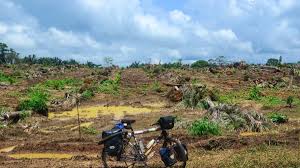FORESTS are vital parts of the ecosystems that provide numerous ecological, economic, and social benefits to humanity and the planet as a whole. However, widespread deforestation and forest cutting pose significant threats to biodiversity, climate stability, human well- being, as well as animals that inhabit the forests. Deforestation estimates in Nigeria stands at 163kha/ year, with 12 percent of tree cover lost between 2001 and 2002. According to United Nations, Nigeria has the highest deforestation rate in the world, with an estimated 3.7 percent of its forest lost every year.
In Nigeria, deforestation has become a severe issue due to the country’s rapidly growing population, coupled with the increasing demand for timber, fuel wood and agricultural land. Activities such as expanding agriculture, logging, urbanization, and infrastructure development contribute to deforestation and present various challenges against afforestation efforts.
Deforestation in Nigeria has raised concerns regarding its link to poverty and its environmental consequences. It disrupts the natural balance of the ecosystems, leading to soil erosion, loss of biodiversity and changes in the local climate. Deforestation leads to habitat destruction and fragmentation, resulting in the loss of biodiversity and extinction of species at an alarming rate.
It also contributes to releasing large amounts of carbon dioxide into the atmosphere. Forests play a crucial role in regulating the earth’s climate by sequestering carbon dioxide (C02) from the atmosphere and storing it in trees and soil. Forests cutting releases vast amount of CO2 into the atmosphere, contributing to global warming and climate change.
Deforestation also negatively affects the local population by reducing access to clean water and increasing the risk of flooding and landslides. The removal of trees and vegetation exposes the soil to erosion, leading to nutrient depletion, soil degradation, and increased susceptibility to landslides and floods. Deforested areas often become barren wastelands due to soil degradation and are incapable of supporting agriculture or sustaining ecosystems.
Forests play a vital role in regulating the water cycle by absorbing rainfall, replenishing ground water reserves, and regulating river flows. Deforestation disrupts these processes, leading to reduced water availability, increased flooding and droughts in affected regions.
Some of the drivers of deforestation include; rapid expansion of agriculture. Many people in Nigeria rely on agriculture as a source of income, but expanding farm lands has led to significant loss of forest. Legal and illegal logging which is linked to corruption and weak law enforcement also causes deforestation. Another major cause of deforestation is urbanization, as cities continue to grow and expand leading to the deforestation of forests in urban areas.
To address the challenge of deforestation which is already a pressing issue in the country with significant impacts on both the environment and the people who rely on it, we advocate for the promotion of sustainable Agricultural practices that can help to reduce the pressure on forests. This can be achieved through the use of better farming techniques, such as conservation agriculture, agroforestry and use of improved seeds and fertilizers.
Government should vigorously pursue afforestation enlightenment campaigns to discourage cutting of trees and encourage the citizens to plant trees in their homes, as well as create green areas. Efforts should also be geared towards promoting sustainable forestry practices, such as selective logging and reforestation.
To protect and preserve the ecosystems for the benefit of present and future generations, we urge the government to be more committed to law enforcement and address the issue of corruption, which can help to reduce illegal logging and other activities contributing to deforestation.


